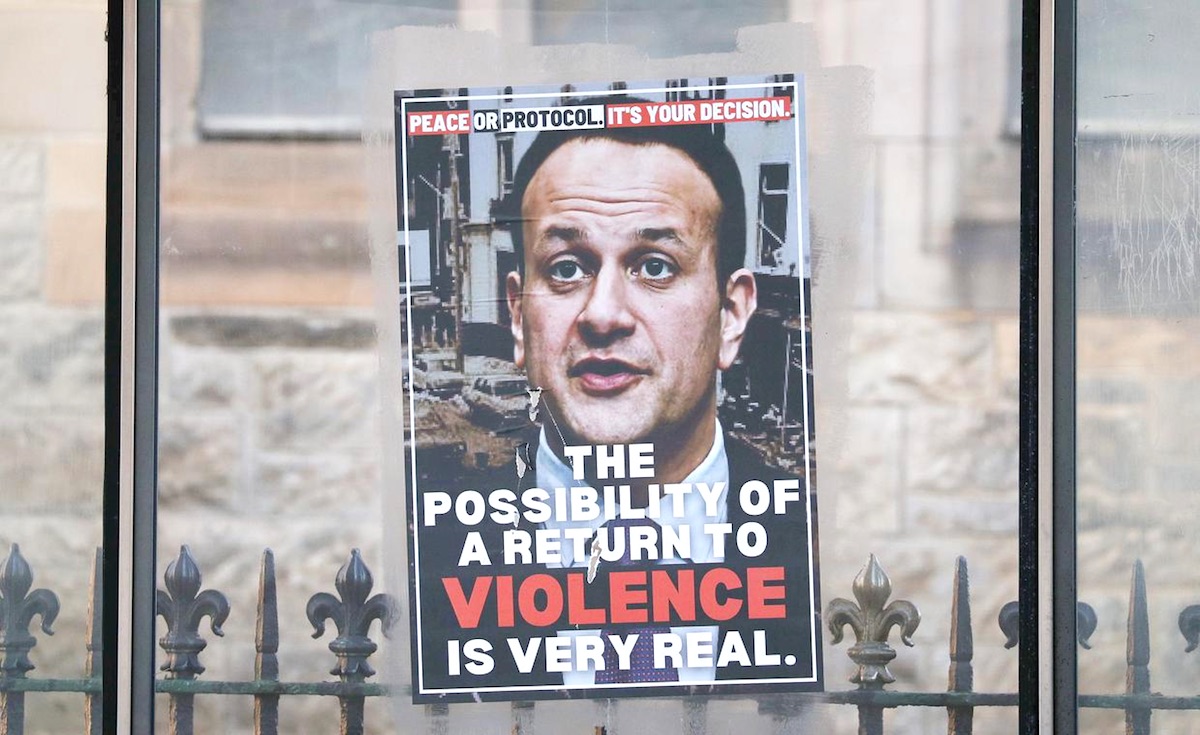
The PSNI police have been urged to take action against the erection of intimidatory posters of Fine Gael leader Leo Varadkar against the background of an image of the Dublin/Monaghan bombs.
The posters have appeared in loyalist areas of Belfast to coincide with Mr Varadkar’s elevation to the post of Taoiseach as part of a rotation deal with coalition partners Fianna Fáil.
Varadkar became a loyalist hate figure in 2018 when he joined other British and Irish establishment figures to warn of the danger of border violence if a hard Brexit was imposed on the north of Ireland.
The posters of the newly-appointed Taoiseach warning that ‘the possibility of a return to violence is very real’ appear against the background of the bomb in Talbot Street in Dublin, that claimed the lives of 14 people.
The 1974 attacks were carried out by the unionist paramilitary UVF in suspected collusion with British forces and claimed the lives of 33 people and injured more than 300.
Margaret Urwin of the Justice For the Forgotten campaign group said families of the victims had been very upset by the use of the photo.
“That tensions are being stirred up after all this time about what is basically a trade agreement is appalling,” she said.
SDLP councillor Carl Whyte said he has contacted the PSNI with a view to having the posters removed.
“These posters are a vile attempt to incite people to violence using the most appalling imagery,” he said.
“I understand the concerns that people have about the implementation of the Withdrawal Agreement and the Northern Ireland Protocol but we all need to be clear - there is no cause that is worth the horrific price that these images invoke.”
Despite the appearance of the posters, there have been upbeat reports of a potential ‘landing zone’ in talks beween the EU and Britain over the implementation of controversial trade checks at ports in the north of Ireland.
A High Court ruling that former DUP Minister Edwin Poots unlawfully took a politically motivated decision to try to halt the port checks was also seen as a useful clarification.
However, the British prime minister Rishi Sunak failed to signal any progress on the issue during a visit to Belfast to meet local politicians.
Speaking after a brief meeting with Stormont party negotiators followed by a photocall on Thursday night, Sunak said he was committed to “resolving some of the issues” around the protocol, which he hoped would convince unionist hardliners to end their boycott of the Belfast Assembly.
Sinn Féin First Minister-designate Michelle O’Neill called on the British government to clarify if its deal-breaking Protocol Bill has been “put on ice” following reports to that effect.
The legislation, which breaches international law, sharply escalated political tensions when it was introduced under former British PM Boris Johnson in June.
Ms O’Neill condemned Sunak’s “radio silence” and called on the London government to set out a plan to restore the Stormont institutions. She said there had been “multiple deadlines” but “no actual plan”.
London had “instead fuelled political paralysis” and had left people struggling with huge fuel bills ahead of Christmas without the energy payments they had been promised, she said.
“The DUP’s boycott of the Executive is clearly having no effect on the British government and is simply punishing the public with no purpose other than to create further hardship at a time when people and business need our help.
“It is now well past time that the British government prioritised restoring the Assembly and Executive. We need stability and certainty for politics to work and to help workers and families who are struggling now.”
![[Irish Republican News]](https://republican-news.org/graphics/title_gifs/rn.gif)
![[Irish Republican News]](https://republican-news.org/graphics/title_gifs/harp.gif)

